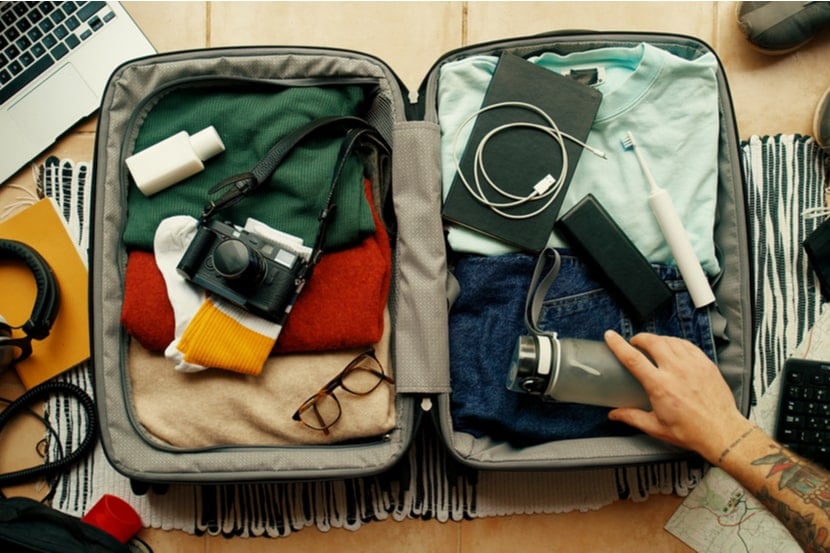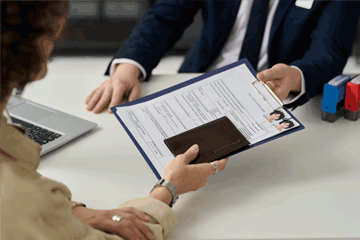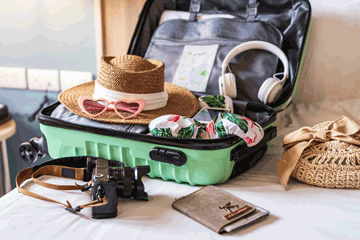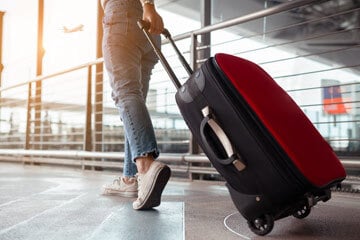Our holiday checklist will remind you of everything you need to take abroad, so you don't need to worry about forgetting anything! Find out what to prepare—from essential items to suncream and maps. Scroll on.

What should be on my holiday checklist?
Before you jet off, make sure you've got these covered:
The non-negotiables
-
Passport. You won't get far without this! Some countries have specific passport validity requirements. You can use our passport checker to see if there's enough time left on your passport for your destination.
-
Visa. Rules vary depending on where you're going and why. Check well in advance to avoid surprises. GOV.UK is a great resource.
-
Boarding passes. Some airlines can charge extra if you don't print or download them beforehand. Save yourself any hassle by bringing printed versions along with you.
-
Boarding passes. Some airlines can charge extra if you don't print or download them beforehand. Save yourself any hassle by bringing printed versions along with you.
-
Cash and cards. Having a small amount of local currency is a smart idea. And, if you're planning to go cashless for the majority of your time, consider a pre-paid travel card to avoid transaction fees.
On-the-go essentials
-
Driving licence. This is a must if you're planning to rent a car! You might also be able to use it as an ID in some places. Just keep in mind, some destinations require an International Driving Permit, so double-check.
-
Medication. Pack more than you think you'll need and split it between your carry-on and checked luggage—just in case.
The things you'll kick yourself for forgetting
-
House keys. There's nothing worse than coming home from a dreamy holiday only to be locked out!
-
Travel insurance. Don't leave it to the last minute! Consider getting holiday insurance as soon as you book your trip to make sure you're covered from the get-go.
Keep in mind: If you've lost your passport or it's no longer valid, it's possible to get replacement emergency documents.
What should I pack for a summer holiday?
- Swimwear. It's worth bringing a few so you're never short of a set.
- Light, breathable clothing. These will help you stay cool in the heat.
- Evening wear. Perfect for dining or exploring in the evenings. Some hotels have dress codes, so check in advance.
- Waterproof bag. This will protect your valuables from sand and water, making it a better choice than a straw tote.
- Beach towel. An essential for sunbathing and drying off after swimming. Want to save on space? Consider a microfibre beach towel.
- Hat and sunglasses. These are ideal for keeping your eyes and face protected from the sun's rays.
- Lip balm with SPF. Regular sun cream isn't as effective on lips and can wear off quickly. So, pack an SPF-enriched lip balm in your bag.
- Insect repellent. Nobody wants to get bitten! Consider bringing bug spray or wearing insect-repellent bands.
- Flip flops or sandals. Flip flops and sandals are convenient for beach and pool days. Plus, you won't have to worry about pesky sand getting stuck in your shoes!
- Goggles. Planning to go for a dip? A pair of these are worth chucking into your suitcase.
- Fins or scuba-kit. If you're into diving or snorkelling, these will come in handy. You might even be able to rent this equipment once you get there.
- Hygiene products. Pack everything you'll need—like shampoo, conditioner, shower gel and any other personal care items.
- Sturdy shoes for excursions. If you're going sightseeing, bring a pair of comfortable walking shoes.
- Backpack. Perfect and practical for keeping all of your things.
- First aid kit. This is worth bringing, just in case.
- Warm clothing for the journey home. After spending a week or two in a warm climate, you might find the journey home chilly! Bring a jumper to throw on once you land back in the UK.
- Camera. Bring your go-to digital camera or opt for your phone's camera to capture those special holiday memories.
Insurance to think about: Planning water sports activities? You might need specialist activity travel insurance in case of injuries.
Family-friendly essentials:
Going away with the family? Make sure you've got these before you go:
- Push chairs. A lightweight, foldable stroller will be perfect for getting around.
- Baby food. Make sure you have everything your baby needs and extra, just in case.
- Baby wipes. These are handy for quick clean-ups, whether you're at the beach, by the pool, or out for dinner.
- Things to distract your children on the flight (including snacks!). Keep the kids occupied on long travel days with games, movies and even their favourite tasty treat.
- Nappy changing pack. This is a convenient must-have when you're out and about.
- High-SPF sun cream. Choose one that protects against UVA/UVB rays, and is suitable for children's skin. Reapply frequently, especially if swimming or sweating.
- Inflatables and beach toys. Consider buying them at your destination to save on luggage space.
- Favourite toys. Have your little ones pick a few comfort items to bring along for the adventure.
Insurance to think about: Everyone will need to be covered, including your children! Consider family travel insurance, it might work out cheaper than buying separate, individual policies.
What should I pack for a ski holiday?
Packing for a ski holiday can be tricky! Winter gear is bulky, and weight limits can be restrictive. Some equipment you might bring yourself, but there's usually plenty of items to rent at your destination. Here’s the list of must-haves:
- Skiwear, sunglasses and hats. Essential items include a ski jacket and warm salopettes.
- Base layers. Don't forget ski socks, gloves and thermal base layers for warmth.
- Helmet. You might be able to rent one of these at the ski resort if you don't have one already. They're also a requirement for most winter sports insurance policies.
- Sun cream. Yes, you should be wearing this even if it's cold! The winter sun can still cause damage, so make sure you bring some in your luggage.
- Skis, snowboards, boots and poles. Bring your own or rent them once you get there.
- Lift pass. You'll need this to get around the resort! You can usually get this ahead of time, but some resorts let you buy it once you get there.
- Sturdy footwear. If you're planning to explore the surrounding town or resort, you'll need some comfortable walking shoes.
- Warm clothes for off the slopes. You'll want plenty of clothes to stay warm and cosy in when you're not out on the slopes!
Insurance to think about: It’s really important to look into winter sports travel insurance before you go skiing. It can cover you for a variety of things that can go wrong, like getting injured.
What should I pack for a city break?
City breaks are usually short, so you'll likely be able to pack light. Besides looking into city break insurance, use this checklist to make sure you've got everything you need:
- Map. Or, a map downloaded on your phone. This will be helpful for getting around.
- Download Uber. Uber or local taxi apps can help you get around hassle-free.
- GHIC health insurance card if you’re travelling in Europe.
- Comfortable walking shoes. City trips often involve plenty of walking, so bring your comfy shoes!
- Weather appropriate gear. Pack clothes that are appropriate for the season.
- A bag that you can carry for decent distances or that’s safe out at night. A backpack or cross-body bag are great for long, sightseeing days.
- Medicines and prescriptions. Bring what you need plus extra, just in case.
- Train, plane or bus tickets if you’re travelling within a city.
- Water bottle or flask. Most cities have free water-filling stations.
- Umbrella. Just in case it rains!
Helpful hint: Many travellers prefer to bring hand luggage only to skip waiting around in baggage reclaim. If you'll be carrying a handbag, check if your airline allows this and a separate hand luggage bag. Our airline baggage calculator can help you with this!
What travel documents do I need?
We’ve already mentioned the main ones, which are passports, visas, travel insurance, boarding passes and drivers’ licences.
However, there are other things to consider. If you’re travelling within Europe, you should make sure you take your GHIC. This is a free document that should get you access to state healthcare in Europe. It’s quick and easy to apply.
It helps to have printouts of the most important booking confirmations. Having multiple copies (one in hand luggage and one in suitcases for example) can be a valuable back up.
Documents to print and take with you:
- Flight details and boarding pass, including your return flight
- Insurance certificate (you need travel insurance for Cuba. It's a legal requirement and you may be asked to show proof on arrival)
- Hotel confirmation—it'sworth bringing a printed copy just in case, even if you have it on your phone!
- Any Visa confirmation (for instance your ESTA confirmation if you’re going to America)
- Booking confirmation for any internal travel, excursions or activities
Essential documents to pack
-
Passport and visas. We've already mentioned these, but it's important not to forget them. Make sure you're checking passport and visa requirements well in advance to avoid issues. For instance, you should make sure you understand the ESTA requirements if you're travelling to the USA.
-
Travel insurance certificate. In some countries, like Cuba, it's a legal requirement to have this. For example, without travel insurance for Cuba, you could be denied entry.
-
Boarding pass and flight details. This also includes your return flight!
-
Hotel booking confirmation. Bring a printed version along with you so you can check-in easily. Alternatively, you can download and save it on your phone.
-
Internal travel and activity bookings. If you've booked any additional travel or excursions in advance, bring along the relevant confirmations to prevent problems.
Additional documents to consider
-
Global Health Insurance (GHIC) card. If you're travelling to Europe, make sure you bring your GHIC or European Health Insurance Card (EHIC) if it's still in-date. It'll grant you free or subsidised healthcare in many European countries.
-
Emergency contact details. Make a note of a list of important numbers, including your country's embassy, just in case you need it.
Remember to get travel insurance!
Buying travel insurance isn't a legal requirement. But, it can be a lifesaver if things don't go to plan.
Imagine finally arriving at your dream destination, only to find out your suitcase got lost along the way. Or worse, you get injured and face expensive medical bills abroad. Having the right insurance can help with all of that.
Here's what a standard policy usually covers:
-
Repatriation (this just means getting you back home if you need treatment)
If you're planning something adventurous like skiing, scuba-diving, or extreme sports, a basic policy might not cover you. Instead, you'll need enhanced cover for these types of activities. They're called policy add-ons, and can be added to your standard policy for a cost. When you get a quote, look for the 'extras' section.
Buy insurance as early as possible if you can. This way, even if your trip gets cancelled, you'll have a better chance of getting back your money. And, if possible, don't just go for the cheapest policy you see. Make sure you're getting the level of cover you need for you and the type of holiday you're going on. Our holiday budget calculator can help you factor in the cost of travel insurance.
Compare travel insurance








